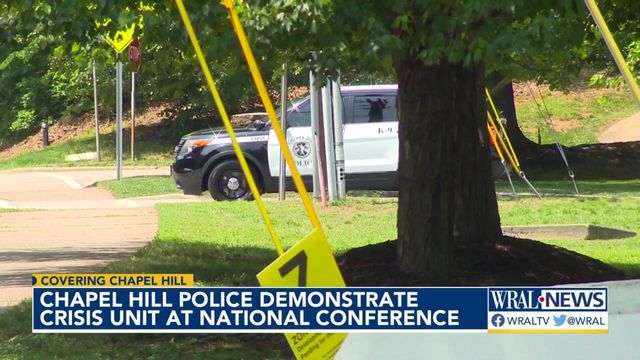Chapel Hill hosts National Co-Responder Conference as need for mental health calls increases
Chapel Hill is hosting the annual National Co-Responder Conference this week.
The conference in its third year, and is organized by the International Co-Responder Alliance. The event brings together law enforcement agencies and mental health professionals from 25 states, with more than 300 people attending.
Co-responders are social workers or mental health professionals who respond to calls for service.
Board Chair Jessica Murphy says co-responders can work with police to serve the community.
"Co-responders really are about the right intervention, at the right time, by the right individual," Murphy said. "Our intent is to have a mental health professional go out on 911 calls with first responders. Instead of having individuals have to go to the emergency room or other facility for support with their mental health needs, we want to bring those services to them in the field at home where they’re at."
Murphy said the need has grown since the pandemic.
"We’re definitely seeing an uptick in our area with the increase of needing more mental health support, and that’s all levels, whether it’s needing outpatient support or different support people need acclimating to get back to normal life post pandemic," Murphy said.
Chapel Hill’s crisis unit program has been around since 1973.
CHPD Captain Joshua Mecimore says although their program has been around for almost 50 years, they’re still learning and growing.
"It’s important to have a conference like this so that people can come and people wanting to start programs can learn about it, figure out what people are doing well and what might work well in their community," Mecimore said.
Patrol officers at Chapel Hill also go through crisis intervention training, but co-responders can connect people to long-term help.
"We live in a community that has lots of resources for people with mental illness or with substance abuse issues," Mecimore said.
Kirby Jones is one of five crisis counselors with the Chapel Hill Police Department.
"We dress in plain clothes," Jones explained. "Sometimes we respond with police officers to help bridge that gap, sometimes we respond without officers if police are not needed."
During Monday’s breakout session, he led a presentation on serving the LGBTQ population.
"They are a growing community that’s involved in the community, and it’s up to us to make sure that we are mindful of the barriers that they run into, and how we as first responders can help them," Jones said.
Jones says while every day is different for his team, the goal of helping those in crisis remains the same.
"The wrong help can be worse than no help sometimes," Jones said.
Captain Mecimore says the crisis unit keeps people struggling with mental health or substance abuse issues out of the court system.
"It also lets us focus on things that are criminal issues, because mental illness is not a criminal issue. And so it’s not necessarily a police issue, it’s just that often we’re the people that get called immediately," Mecimore said.
The National Conference includes breakout sessions on connecting with faith-based communities, dealing with youth mental health issues, and creating rural co-responder programs from the ground up.











